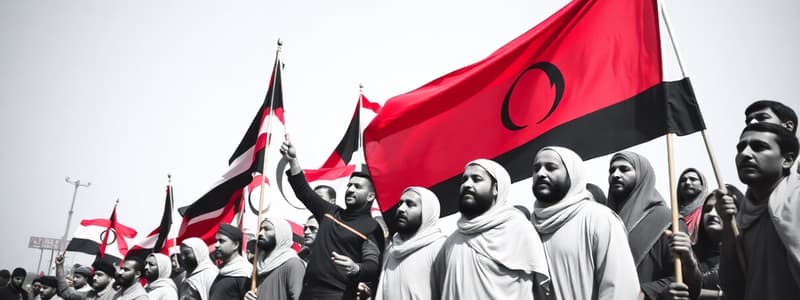Podcast
Questions and Answers
What was one significant outcome of the French Mandate in Syria?
What was one significant outcome of the French Mandate in Syria?
- It led to the immediate independence of Syria.
- It unified all religious groups under a single government.
- It caused a rise in agricultural productivity.
- It increased ethnic tensions and divisions. (correct)
The formation of Greater Lebanon during the French mandate was primarily intended to address which issue?
The formation of Greater Lebanon during the French mandate was primarily intended to address which issue?
- To encourage economic dependency on France.
- To accommodate the diverse religious communities in the region. (correct)
- To create a more homogeneous Muslim state.
- To compensate for lost territories outside the Ottoman Empire.
What was one impact of the British Mandate in Iraq on national identity?
What was one impact of the British Mandate in Iraq on national identity?
- It eliminated tribal affiliations completely.
- It led to the establishment of a communist regime.
- It fostered a sense of distinct national identity among Iraqis. (correct)
- It unified all ethnic groups under a common flag.
How did World War II influence Lebanon and Syria?
How did World War II influence Lebanon and Syria?
Which factor contributed to the complex ethnic divisions in colonial Syria?
Which factor contributed to the complex ethnic divisions in colonial Syria?
What administrative change did France execute in 1920 to establish control over Lebanon?
What administrative change did France execute in 1920 to establish control over Lebanon?
How did the French approach the management of ethnic divisions in Syria during their mandate?
How did the French approach the management of ethnic divisions in Syria during their mandate?
What was the outcome for Iraq under Emir Faisal after the British granted him rule?
What was the outcome for Iraq under Emir Faisal after the British granted him rule?
What impact did World War II have on Lebanon and Syria during the French mandate?
What impact did World War II have on Lebanon and Syria during the French mandate?
What was the result of the British alliance with Iraq in 1922?
What was the result of the British alliance with Iraq in 1922?
Flashcards are hidden until you start studying
Study Notes
The Origins of Arab Nationalism: The Nahda
- The idea of Arab nationalism emerged based on shared linguistic, historical, cultural, and spiritual ties.
- Secular Arab nationalism was initially championed by Christian communities who emphasized the revival of the Arabic language and culture.
- The Nahda movement encouraged dialogue about secularism, religious freedom, and the right of Arab provinces to self-governance and independence.
- The Nahda movement saw diverse political and philosophical stances, ranging from pan-Islamism to ethnic-nationalism.
- Arab nationalism aimed to unify Arabic-speaking peoples, excluding Turks, Iranians, Pakistanis, etc.
- The Nahda highlighted the active participation of a Christian minority within Arab-Islamic civilization.
- It also saw the emergence of a reformist and modernist-inspired trend among Muslims.
The Fall of the Ottoman Empire and the UN Mandate System
- World War I led to the Ottoman Empire's defeat and dismemberment, shaping a new regional order.
- The Ottoman Empire's war objectives included breaking free from European control through the Capitulations regime, regaining lost territories, and unifying Turkish-speaking populations.
- By the war's onset, the Empire had 25 million inhabitants, with under half being Turks.
- Turkey was exempted from paying war debts, and the Straits were granted back to Turkish control.
The Implementation of Peace Agreements in Arab Areas
- French General Gourad occupied Damascus, defeating Faisal's Arab forces in 1920.
- France established the Mandate for Syria and Lebanon, leading to the creation of Greater Lebanon.
- Greater Lebanon expanded beyond the historical Mount Lebanon, incorporating coastal cities and the Bekaa Valley.
- Lebanon declared itself a republic in 1926 but remained under French troops until 1946.
- France divided Syria into different state entities, fostering existing ethnic and religious divisions to discourage a Syrian national identity.
- Syria declared independence in 1941 but remained under effective French control until 1946.
UK and the Middle East
- Britain granted Emir Faisal, the deposed king of Syria, the kingdom of Iraq in 1921.
- Iraq gained independence in 1932, but its government maintained close economic and military ties to Britain.
- Anti-British revolts occurred due to these ties, leading to British military intervention in 1941.
The British and the Arab Uprisings
- Britain adopted a dual strategy in the Arabian Peninsula.
- They negotiated with Ibn Saud, ruler of the Najd, to prevent Ottoman supply lines through the Persian Gulf.
- They also negotiated with Sharif Hussein of Mecca to avoid Islamic solidarity through the Hussein-McMahon Correspondence.
- The British pledged to create a large Arab kingdom for the Hashemites in exchange for support against the Ottomans.
Peace Agreements II: Mandate Regimes
- The Mandate Regime emerged as a new instrument of neo-colonial control.
- In 1920, the Supreme Allied Council granted French mandates for Syria and Lebanon, and British mandates for Iraq and Palestine.
- The mandates for Palestine included the obligation to implement the Balfour Declaration, aiming for a Jewish National Homeland.
- These agreements were later incorporated into the Treaty of Sèvres, signed between the Entente powers and the Ottoman government in 1920.
Peace Agreements with Turkey: Treaty of Lausanne 1923
- Turkey relinquished non-Turkish territories but retained part of Kurdistan.
- The Capitulations regime was abolished.
- Greece was expelled from Anatolia, and Greek communities fled the peninsula.
- Turkey defeated Armenian communities with Bolshevik aid, leading to persecution.
- Izmir and invaded islands were returned to Turkish territory.
Studying That Suits You
Use AI to generate personalized quizzes and flashcards to suit your learning preferences.




